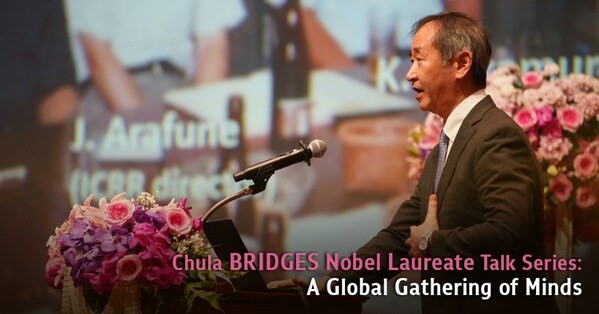BANGKOK, Dec. 18, 2023 /PRNewswire/ -- The Chulalongkorn University BRIDGES Nobel Laureate Talk Series has been unveiled to the public with five honorable keynote speakers whose achievement make a statement in the science world recognised by the prestige global award of Nobel Prize. It is a great opportunity to learn more about their story of success, knowledge and experience, which is ready to be shared with the audience for promoting peace in the global community.
Started with the Nobel laureate keynote speaker Professor Takaaki Kajita who won the Nobel Prize in physics in 2015, the 64-year-old active physicist from the Institute for Cosmic Ray Research of the University of Tokyo in Japan came to reveal a code of success by stressing the importance of closer cooperation from scientists around the world that would be able to unlock the secret of universe.
His renowned project of Super-Kamiokande to decode the universe secrecy is an obvious precedent case, with a gathering for over 600 members from 22 countries around the world, including controversial Russia and Ukrain for finding out better understanding toward the origin of matter in the universe. They have worked together to develop the Super-Kamiokande detector, which is a powerful tool to help the physicists understand more about the universe that it is expected to complete by next year. He has strong belief in international cooperation for producing significant results.
"Peace is very important for science development. And science is more important than the political divides. I think that science, in particular international scientific collaborations, plays a very important role for peace-building," he said at the first session of the Chulalongkorn University BRIDGES Nobel Laureate Talk Series under the topic of "The Importance of Science for Peace-Building".
His strong efforts and dedication to his career path developed the achievement when he had discovered that the oscillations of neutrinos from one flavor to another means that those subatomic particles have mass. It has become some of the most promising, powerful, versatile and efficient way to explore particle physics and the universe itself that won the Nobel Prize.
Additional four Nobel Laureates are on the list. They are Professor Eric S. Maskin, Nobel Laureate for Economics with a topic of "Why globalization has failed to reduce inequality". (January 15, 2024), Professor Edvard Moser, Nobel Laureate for Medicine "The brain's GPS: How we know where we are". (February 12, 2024), Professor Robert F. Engle III, Nobel Laureate for Economics "A financial approach to climate risk". (February 27, 2024) and Professor Randy W. Schekman, Nobel Laureate for Medicine "The role of public universities as an engine for social change". (March 25, 2024). Chulalongkorn University has organised the event in an occasion of a part of the Japan-ASEAN BRIDGES event series facilitated by the International Peace Foundation.
Professor Bundhit Eua-arporn, President of Chulalongkorn University who delivered his opening remark, said that after the resounding success of that series that brought together several Nobel Laureates, other keynote speakers and artists who all reached out to a vast audience of over 200,000 across the Southeast Asian region BRIDGES has now returned to Thailand with the renewed aim of bringing together the best and brightest minds of the world from November 2023 to March 2024: Nobel Laureates in Physics, Economics and Medicine.
This illustrious gathering will certainly inspire and stimulate academic exchange and enhance further development in several key areas, through education, he noted.
Dr. Ram Piyaket, Director of Office of International Affairs and Global Network, Chulalongkorn University, said that the event has reiterated a significant role of Chulalongkorn University by emphasising on the importance of future leader, impactful research and innovation and sustainability development. It is an extraordinary occasion for students and outsiders to learn about the success made by those well-known Nobel laureates who are still active on the job for further research for the better future. This is the second time to organise the event, which the first time was done in 2003.
He has also shared his similarity of thought with Professor Kajita, saying that cooperation is the key of success and the event would create a good chance to strengthen and extend network cooperation among the university's researchers and the Japanese team for further research development in the future. Chulalongkorn University has underlined the point by seeking more cooperation from international partners, and the event is like a bridge to create dialogue towards a culture of peace.
He further noted that promotion of peace is very important for the young generation. They should be cultivated to a new mindset of diversity in global citizenship, which peace is the key to develop the world's future. The event might be able to inspire the young exercising stronger passion for work, with a magic result to change the world.
Meanwhile, Professor Pranut Potiyaraj, Dean of Faculty of Science, Chulalongkorn University, expressed his belief that Thai physicists and students could gain benefits from the talk, saying that Nobel laureate represented the pinnacle of achievement in their fields so the audience would gain insights into the latest development and cutting-edge research in physics.
It could motivate Thai physicists, especially students and early-career scientists to pursue their research with renewed vigor and aspiration. They could learn about international trends in physics research and how global challenges are being addressed through scientific inquiry. The Nobel speakers are sources of knowledge, inspiration and connection, offering numerous benefits to the Thai scientific community.
In his point of view, he believed that physics, combined with AI technology, can offer transformative solutions for future society. For example, physics is going to play a critical role in understanding and improving energy systems. Meanwhile, AI can optimize the design and operation of renewable energy sources. Such as solar panels and wind turbines, enhancing efficiency and sustainability.
Importantly, he added that physics is fundamental in understanding the universe. AI can process the vast amount of data from telescopes and space missions, helping in the discovery of new celestial bodies, the study of cosmic phenomena and even the search for extraterrestrial life.
"I understand that physics is quite complex and difficult. But introduction physics concepts at a younger age in a fun and simplified manner is important. We should create a supportive and non-intimidating learning environment where mistakes are seen as learning opportunities. Actually, physics is relevant in everyday life. The challenging job is how to make them understand effectively," he said.
For the event, the next speaker is Professor Eric S. Maskin, Nobel Laureate for Economics and Adams University Professor at Harvard's Department of Economics in Cambridge, with a topic of "Why globalization has failed to reduce inequality" on January 15 at CU Auditorium, Chulalongkorn University.
For those who wish to attend the session are welcomed to join the events, free of charge. Please make a registration at link https://bit.ly/Chula_BRIDGES.
For the full release and more images, please visit: https://www.chula.ac.th/en/highlight/144549/
About Chulalongkorn University
Chulalongkorn University has made the world's top 50 university list for employment outcomes, which reflects both the high employment rate and work ability of Chula graduates. The university is also listed as the best in Thailand for the 15th Consecutive Year (since 2009), according to the newly released QS World University Rankings 2024, putting Chula at 211th in the world, up from 244th last year.
Social Media:
Facebook: https://www.facebook.com/ChulalongkornUniversity
Youtube: https://www.youtube.com/chulauniversity
Linkedin: https://www.linkedin.com/school/15101896/
If you would like more information about this topic,
please contact Miss Thanita Wangvanichapan at (+66) 2218 3280 or email thanita.w@chula.ac.th










